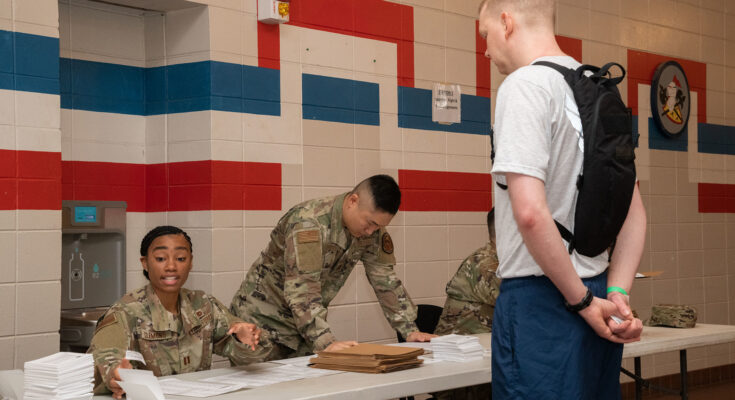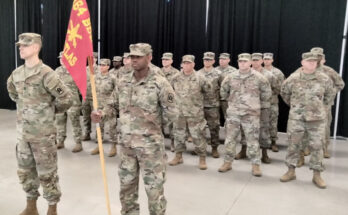United States Hellenic Air Force Recruitment: The United States Hellenic Air Force (USHAF), an illustrious segment of the American defense system, boasts an intricate web of recruitment programs designed to attract, train, and retain the brightest minds.
Comprising of state-of-the-art facilities, rigorous training modules, and a promise of unparalleled career growth, the recruitment drives of USHAF are tailored for individuals yearning for sky-high aspirations.
Overview of United States Hellenic Air Force Recruitment
The United States Hellenic Air Force, an emblematic representation of military prowess, has seen its recruitment strategies undergo significant metamorphosis over the years. This journey traces back to simpler times when recruitment was predominantly manual, relying heavily on face-to-face interactions, to the present day, where technology, analytics, and sophisticated marketing play a pivotal role.
Evolution of Recruitment Strategies Over the Years
Initially, recruitment strategies were primarily based on town hall meetings, military parades, and local newspaper advertisements. With the advent of television and radio in the mid-20th century, recruitment ads started reaching a wider audience, encapsulating the spirit of service and duty.
The digital era heralded a new chapter. By the turn of the 21st century, the internet became an indispensable tool. The Hellenic Air Force started leveraging social media platforms, virtual reality experiences, and targeted online campaigns to attract potential recruits. These strategies not only broadened their reach but also enabled them to tap into specific demographics with tailored messaging.
Key Objectives and Goals of Current Recruitment Programs
The present-day recruitment programs of the United States Hellenic Air Force are driven by several objectives:
Diversity and Inclusivity: A paramount goal is to ensure a diverse and inclusive force, representing the rich tapestry of the American society.
Technical Proficiency: With advancements in aviation technology, there’s a heightened focus on recruiting individuals with specific technical expertise and a willingness to undergo rigorous training.
Physical and Mental Fitness: The Air Force continues to prioritize recruits who demonstrate exceptional physical and mental robustness, ready to tackle the dynamic challenges of modern warfare.
Building Lifelong Careers: Beyond just recruitment, there’s an emphasis on building lifelong careers, offering opportunities for growth, education, and leadership.
However, the United States Hellenic Air Force’s recruitment strategies have evolved to mirror societal changes and technological advancements. Their present-day objectives underscore a commitment to excellence, inclusivity, and the readiness to face future challenges.
Eligibility and Application Process of United States Hellenic Air Force Recruitment
Understanding the eligibility criteria and application process for the United States Hellenic Air Force is paramount for potential candidates. Ensuring you have the right information can pave the way for a seamless application journey. Here’s a comprehensive look:
1. Basic Requirements for Candidates
Age Criteria: Most military branches have age limits; candidates should be within the specified age bracket.
Educational Qualifications: A minimum educational background, often a high school diploma or equivalent, is mandatory.
Physical Fitness: Candidates must meet specific health and physical fitness standards.
Citizenship: Usually, only U.S. citizens or legal residents are eligible.
Criminal Record: A clean criminal record is vital. Some minor offenses can be waived, but felonies are typically disqualifying.
Medical Requirements: Certain medical conditions can disqualify a candidate, so a comprehensive medical exam is often required.
2. Steps to Apply for the United States Hellenic Air Force
Online Inquiry: Begin by visiting the official recruitment website for detailed information and an initial online application form.
Visit the Recruitment Office: After completing the online inquiry, schedule a visit to your nearest recruitment office for a face-to-face discussion.
Initial Screening: The recruitment office will conduct an initial screening to ensure you meet the basic requirements.
Written Exam: Candidates might need to take a written exam testing general knowledge, arithmetic, and other relevant skills.
Physical Examination: Undergo a thorough medical and physical exam to ensure you’re fit for the service.
Final Interview: Successful candidates will be invited for a final interview, usually with senior recruitment officials.
Training: Once selected, candidates undergo rigorous training before formal induction.
3. Necessary Documentation and Preliminary Tests
Documents: Essential documents usually include a birth certificate, social security card, educational certificates, and if applicable, citizenship or residency documents.
Background Check: Expect the recruitment office to conduct a thorough background check, including your criminal record, financial history, and more.
Drug Tests: Mandatory drug tests are conducted to ensure candidates are free from prohibited substances.
Medical Examination: As mentioned, candidates undergo a medical examination to check for disqualifying conditions.
Ensuring that you’re well-prepared and aware of what’s expected can make your application to the United States Hellenic Air Force smoother and more successful. Always remember to consult the official recruitment channels for the most accurate and up-to-date information.
Key United States Hellenic Air Force Recruitment Programs
Officer Training Program
The Officer Training Program serves as the gateway for aspiring leaders looking to make their mark in the United States Hellenic Air Force.
Training Structure and Duration: The program is meticulously designed, encompassing a broad spectrum of skills and knowledge. Trainees undergo rigorous physical training, leadership development, and tactical education over a period of several months. This ensures they are adequately equipped to lead and make critical decisions in challenging environments.
Specialized Roles and Career Paths Post-training: Upon successful completion, officers have the opportunity to venture into a variety of specialized roles such as pilots, intelligence officers, and logistics specialists. Each path promises unique challenges and rewards, setting the stage for a fulfilling career within the Air Force.
Enlisted Personnel Recruitment
For those who seek an esteemed position but not necessarily in leadership, the enlisted personnel ranks provide numerous opportunities.
Positions Available for Non-officers: Enlisted members can pursue roles ranging from aircraft maintenance to medical services and communications. The United States Hellenic Air Force values the diverse skill set that enlisted personnel bring to the table, as they form the backbone of operations.
Benefits and Growth Opportunities: Enlisted personnel are not only rewarded with competitive salaries but also enjoy comprehensive benefits, including healthcare, education assistance, and retirement plans. Moreover, there’s significant room for growth, with continuous training programs and potential to rise up the ranks.
Reserve and Auxiliary Programs
The United States Hellenic Air Force’s strength is not just in its active personnel but also in its reserve and auxiliary forces.
How Reserve Programs Support the Main Force: Reservists play a pivotal role by providing supplemental support. They train periodically and can be activated during times of increased operational demand, ensuring that the Air Force remains adaptable and resilient.
The Role of Auxiliary Units in Emergency Situations: Auxiliary units are instrumental during emergency situations. Trained specifically for crises, they are rapidly deployable and can perform tasks ranging from search and rescue to emergency medical support. Their versatility ensures that the Air Force remains prepared for any contingency.
Benefits of Joining the United States Hellenic Air Force
Joining the United States Hellenic Air Force offers a myriad of benefits that go beyond the call of duty. Here, we highlight some of the top perks that come with dedicating your skills and passion to this prestigious institution:
Competitive Salaries and Allowances:
The United States Hellenic Air Force is renowned for offering its members a remuneration package that stands tall in comparison to industry standards. Not only are the base salaries competitive, but servicemen and women also receive additional allowances, ensuring that their financial needs are well catered for.
Learning and Personal Growth Opportunities:
Your personal and professional development is a priority in the United States Hellenic Air Force. Members are consistently exposed to training programs, workshops, and seminars that enhance their skills and knowledge. The experience and learning gained here set the foundation for a lifetime of growth.
Health and Welfare Benefits:
One of the significant advantages of joining the Air Force is the comprehensive health and welfare package. Servicemen and their families enjoy top-tier medical coverage, ensuring peace of mind. Beyond health, the force provides other welfare programs tailored to enhance the well-being and morale of its members and their loved ones.
Career Advancement and International Exposure:
The sky is truly the limit when it comes to career progression in the United States Hellenic Air Force. Members have numerous opportunities to rise through the ranks, take on leadership roles, and even get international assignments. Such exposure not only boosts one’s CV but also offers a unique experience that broadens horizons.
In essence, a career with the United States Hellenic Air Force is more than just a job; it’s a path filled with opportunities, growth, and unmatched rewards. Whether you’re driven by the allure of serving the nation, the promise of personal development, or the myriad of benefits, there’s no denying that this institution offers the best of all worlds.
Challenges and Common Misconceptions
Navigating the world of the Air Force brings with it a unique set of challenges, many of which are fueled by common misconceptions. Let’s debunk some of these myths and shed light on the real issues faced in recruitment and talent retention.
Addressing Myths about Air Force Life and Responsibilities
“All Air Force Jobs are about Flying”: While aviation is a significant component, the Air Force offers a plethora of roles ranging from medical, engineering, IT, to logistics and more. The diversity in career opportunities ensures a broad skill set among its members.
“It’s a Dangerous Job”: Although there are inherent risks in any military role, the majority of Air Force positions emphasize strategy, planning, and support. Safety and training are top priorities, ensuring personnel are well-equipped for their tasks.
“There’s No Work-Life Balance”: Contrary to this belief, the Air Force puts a strong emphasis on the well-being and work-life balance of its members. With opportunities for family housing, education, and other benefits, it ensures a wholesome life for its personnel.
Overcoming Challenges in Recruitment and Retention of Talent
Broadening Outreach: By engaging with diverse communities and educational institutions, the Air Force can tap into a wider pool of potential talent, debunking myths and showcasing real opportunities.
Enhancing Training Programs: Offering state-of-the-art training ensures that recruits feel empowered, skilled, and integral to the Air Force mission, increasing job satisfaction and retention.
Emphasizing Career Growth: By laying out clear pathways for promotions, skill development, and lateral role changes, the Air Force can ensure its members see a long-term future within the organization.
However, by addressing these misconceptions and reinforcing the genuine advantages of Air Force life, we can foster a more informed understanding and appreciation of the institution, encouraging more individuals to consider it as a viable career path.
Diversity and Inclusion in Recruitment
A diverse workforce fosters innovation, creativity, and a broader perspective, vital attributes for any organization aiming to thrive.
The Commitment to Building a Diverse Force
Every organization must pledge unwaveringly to create a workforce that mirrors the richness and diversity of the communities it serves. A diverse workforce not only enhances the brand’s image but also promotes a culture of mutual respect and understanding. By actively seeking out candidates from a myriad of backgrounds, skills, cultures, and experiences, businesses ensure they benefit from varied viewpoints. It’s essential to note that diversity isn’t just about ethnicity or gender; it spans across age, socio-economic status, educational background, and even cognitive diversity. Prioritizing this commitment ensures organizations stay ahead of the curve and appeal to a broader clientele.
Initiatives to Promote Inclusivity in Recruitment Processes
But how can businesses ensure their recruitment processes are genuinely inclusive? Here are some measures:
Blind Recruitment: One effective method is blind recruitment, where personal information that might reveal the candidate’s gender, age, or ethnicity is removed. This ensures candidates are evaluated solely based on their skills and qualifications.
Unbiased AI Tools: With advancements in technology, several AI tools can now help recruiters eliminate unconscious biases from the hiring process, ensuring a fair and equitable selection.
Diverse Interview Panels: By including members from various backgrounds in interview panels, businesses can ensure multiple perspectives are considered, leading to a more balanced hiring decision.
Inclusive Job Descriptions: The language of job advertisements plays a crucial role in attracting a diverse pool of candidates. By ensuring they’re free from gendered terms and jargon, and by highlighting the company’s commitment to diversity, organizations can attract a broader range of potential employees.
Continuous Training: Regular training sessions for HR and recruiting teams on the importance of diversity and how to avoid biases are essential. This ensures the team stays updated and maintains a culture of inclusivity.
However, to remain competitive, organizations must realize that diversity and inclusion are more than just buzzwords. They are key drivers for growth, innovation, and long-term success. Prioritizing them in recruitment processes ensures a brighter, more inclusive future for everyone.
Conclusion
If you’ve ever envisioned a career that marries passion, commitment, and a sense of larger purpose, consider the United States Hellenic Air Force.
Not only does it offer a path filled with honor and pride, but it also opens up a world of opportunities for personal and professional growth.
As the guardians of the skies, every new recruit has the potential to play a pivotal role in shaping the future of our nation’s defense.
So, as you weigh your career options, remember: the sky is not the limit; it’s just the beginning. Join the United States Hellenic Air Force and soar to new heights.



